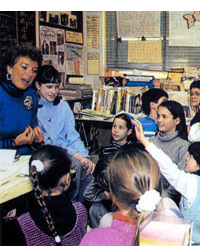|
The retired third-grade teacher from Morley Elementary School has a
new Web site explaining her much-lauded teaching methods and
philosophy. The Web site, Later hopes, will pass on information to
parents, teachers and communities about the importance of teaching
credibility, something Later believes has been somewhat "left
behind" in the Bush-era classrooms of today.
But neither was credibility an oft-covered topic in the 1960s
educational culture, out of which Later first developed her methods.
Later hadn't even given credibility much thought until one day, at
the beach, when she read a magazine article about the difficulty
high-school graduates were having getting jobs. The article struck a
cord in Later. There had to be something she could do. Wasn't there?
Yes. Later set up a new program in her classroom. She had students
apply for classroom jobs - things like turning off the lights before
recess, or feeding the gerbil. Each of the students filled out an
application, explained why they would be good for the job, and
provided Later with student and faculty references.
Later would ask students to find the definition of 'credibility.'
Credibility, she would say, was very important in life. You couldn't
get a job if you didn't have good credibility. Later and the
students explored - in brief skits - the ways persons could be
honest without hurting the feelings of others. Each morning, as the
students filed into class, Later would greet each pupil at the door
and ask them how they were.
"How is your credibility, today," Later would ask.
The program gave the students a feeling of confidence, and many of
Later's students have never forgotten the feeling of responsibility
that came with, say, the closing of a classroom door at the end of
the school day. The notion that credibility is a weighty thing,
indeed, never left them. Amy Alloy is one such former pupil.
Now 26, Alloy was taught by Later in 1989, when she was in the third
grade. A fourth-grade teacher in New Haven, Alloy said the jump from
second grade to the third is enormous, and Later's program allowed
the teacher to relinquish some of her power and build the students
up with the feeling of being both responsible and credible.
It was amazing to feel such responsibility in third grade. It
definitely made you feel special," Alloy said.
Knowing as much, Alloy has used some of Later's methods in her own
fourth-grade classroom. Each morning, Alloy stands at the door to
her classroom and checks in with each of her students. That way, she
knows what is going on in their lives. It gives a context to their
words and actions. Alloy said she has better contact with her
students because of Later and her teaching methods, which, Alloy
believes, were ahead of their time.
"She always came up with such great projects. In a time of
worksheets, she wasn't a worksheet teacher," Alloy said. "She made
things come alive."
For more information about Sandy Later and her teaching method,
visit www.teachcredibility.com.
|


